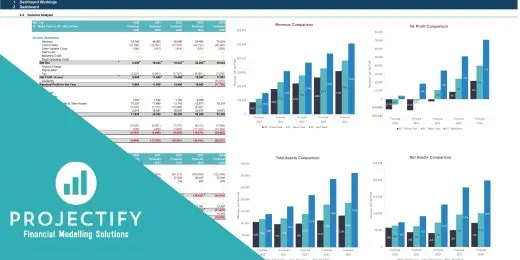Career-Boosting Reasons: Why You Need to Learn Financial Modeling

Financial management is one of the most demanding fields, not only in the business world but also in other sectors. Sophisticated financial management expertise requires obtaining an in-depth understanding of financial scenarios and therefore more advanced financial management techniques will include financial modeling tasks.
Learning financial modeling is one of the areas that financial analysts, auditors, and other financial experts are quite keen to master as it enables them to obtain a solid understanding of how companies generate profit and value for shareholders. Financial models are mostly used by decision-makers in business, therefore you can give your career a slight boost when learning financial modelling early on.
What is Financial Modeling?
A financial model is designed to represent in mathematical terms the relationships between the determining factors influencing the financial performance of a business. A financial model is needed to better understand how a business generates profits and which key factors determine the financial outcome. This is normally done by varying the assumptions by running different scenarios to better understand how those changes affect the financial outcome.

Financial models normally are built by using spreadsheet programs such as Excel or Google Sheets. Though most often, financial modelers prefer building a financial model using MS Excel due to its flexibility, financial modeling features and functions, transparency, and many more reasons which makes the program ideal for building a financial model. Of course, there are other programs or tools used for creating spreadsheets, however, since Excel is widely used by everyone, it allows an easier transition, especially when working with others.
By using Excel or Google Sheets, building financial models becomes less time-consuming. But of course, proper know-how is critical in financial modeling, as such, learning financial modelling to lessen the time it takes to build a financial model is very important.
For more information regarding what is a financial model and what is financial modeling, please refer to the article explaining more about financial modeling.
What you can do with it?
There’re are a number of areas in which financial modeling skills can be useful to master. For example, when evaluating a new solar energy park, it is essential to prepare detailed financial projections over the lifetime of such a project in order to compute the Internal Rate of Return (IRR), the Net Present Value (NPV), Debt Coverage Ratios and more. The financial model will be used by investors and banks to figure out if they want to invest in it.
Key executives in an organization use the outputs of financial models or conclusions such as valuation estimations to make financial decisions, particularly on budgeting, capital allocation, asset management, fundraising, and whether to pursue acquisitions of other businesses or not.
As for financial analysts, by learning financial modelling, they can better understand and assess how changes in the economy might impact the valuation of stocks they follow. They will build a financial model for each stock and simulate how expected changes in key parameters can affect the fundamental value of a stock. Based on such analysis buy/hold/sell recommendations can be issued.
Another way that you can utilize finance modeling is to monitor the value creation process of a company. Specialized consultants – through the help of a financial model – can translate changes in costs, revenues, etc. to assess the impact on shareholder value generated.
In the corporate and investment world, financial modelling is also used to run different scenarios to assess the implications of important changes in parameters on the financial outcome. Sensitivity analysis will tell which parameters change the financial outcome by how much.
Why Learning Financial Modelling Matters?
In business life, there are various roles that require a thorough understanding of how financial models are built and how to work with them. Especially the following professionals will need to learn financial modelling and master the skill inside out:

Financial Advisors: As a financial advisor or financial analyst, it is crucial to learn financial modelling as it is useful in the valuation of businesses, assets, analyzing investment propositions, fundraising or determining the financial feasibility of new investment projects. Therefore, learning financial modelling in Excel is an essential skill to master if you like to advise your clients on financial matters.
Investment Managers: The job of an investment manager is to analyze and evaluate new investment propositions as well as monitor and grow existing investments until they can be exited. As professional investors require a rational way to make investment decisions, they will have to build sophisticated financial models to understand how the investment can work out for them, how much return can be generated, and how the return changes when the scenario assumptions change.
CFOs, Financial Controllers, Business Analysts: Financial controllers normally deal more with budgets and cost control tools. Only some part of their work includes analyzing investment propositions where more sophisticated financial models are needed. They will have to build financial models to understand the financial feasibility of a proposed investment project and to study the risk-return balance of such projects.
Key Executives, CEOs, and Entrepreneurs: These parties are normally the recipients of analyses prepared through the help of financial modeling techniques and they will be asked to make important business decisions on that basis which will affect the future financial situation of the company. Here, the requirement is more to better understand the limitations and explanatory powers of financial models built in certain ways and to assess to which extent business decisions can be based upon the outcome of financial models.
These are just a few of the parties to mention that might be required to learn more about financial modeling.
Learn Financial Modelling: Mastering MS Excel
To learn financial modelling, it is important to master MS Excel inside out. MS Excel is the spreadsheet program of choice for most financial modelling professionals when preparing their financial models. Mastering Excel allows building better well-structured financial models with designs that allow obtaining complex financial equations in simple terms. Financial modeling takes time, therefore it is important to know all the key shortcuts Excel offers.
Where to Find Career Prospects in Financial Modeling?
There are various career opportunities that one can venture upon by mastering financial modeling. Here is a list of possible career opportunities:
- Banking: Investment Bankers, Asset Managers, Equity Research, etc.
- Consultants: M&A Advisors, Strategy Consultants, Market Research,
- Investors: Investment funds, family offices, Private Equity, Hedge funds, etc.
- Corporates: Corporate development, controlling or CFO, Project Managers
- Freelancing: For professionals mastering Excel and financial modeling inside out
- Entrepreneurs: Will need a financial model at some stage when it comes to fundraising or exit
These are just to name a few career paths where you will be confronted with financial modelling tasks. There are many more fields where financial modelling plays an important part and opens up career paths.
Conclusion

Financial modeling plays an important part in business preparing the basis for rational decision-making. Leaders in business nearly base all their decision-making on the outcomes of financial analysis and scenarios built-in spreadsheet programs. Furthermore, learning financial modelling opens up a variety of career paths in investment banking, corporate development, investment management, and controlling functions. So what are you waiting for? Get started and learn financial modelling today to give your career the next boost or check out our financial modelling templates.













